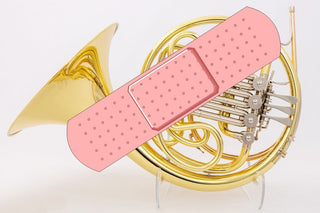Here’s a quick guide to some retail terms that might allow you to snag a great deal on a basically-new instrument.
A Stock
If an instrument (or any retail product, really), is labelled “A Stock”, that means it’s brand-new and in perfect condition. Other than a test-play at the factory for quality control purposes, and maybe a customer or two who tested it off the shelf in the store, you may be the very first person to play that instrument. So you’ll probably pay full price for it.
B Stock
If an instrument is labelled “B Stock”, that probably means the manufacturer is discounting the price a little because of some kind of minor defect. For example, they might be charging $100 less because of a bubble in the lacquer, or $200 less because of a dent in a slide.
Maybe the bell got a small dent during shipping, which has since been repaired.
Or someone bought the instrument, then returned it a week later, so it no longer looks brand-new. Because it’s been used a few times, it might have fingerprints tarnished into the lacquer or a small scratch.
But at any rate, most instruments don’t get labelled “B Stock” if they have major damage – it’s almost always going to be something tiny you probably won’t even notice unless the sales staff points it out to you. That’s what makes B stock instruments great deals! They play exactly the same as an A stock instrument, they come with the exact same case and accessories and warranty as an A stock instrument, and once you’ve been carrying them around for a few months they’ll have that same level of small scratches and dents anyway.
If you’re set on a new brand-name instrument but your budget is tight, a B stock instrument can be an easy way to save a couple hundred bucks.
Demo
Most manufacturers label instruments a “Demo” if they have shown them around at conferences and conventions and allowed customers to try them out. A demo usually has some minor cosmetic damage from being test-played by multiple customers: a few scratches in the lacquer, a minor dent in the bell that has since been repaired, the sort of thing you won’t even notice unless you go over the entire horn with a magnifying glass.
At Houghton Horns we tend to lump both B stock and demo instruments together under the “Demo” tag. Either way, it means you’re getting a basically new instrument for a $100 discount or more. Ask the sales staff to show you why it got marked down, and you’ll probably be surprised at how easy it is to save yourself a Benjamin or two!
C Stock
C stock is a step below B stock. Perhaps there was more serious damage to the instrument which has since been repaired, so it plays just fine, but the manufacturer doesn’t feel like they can in good conscience sell it to you at full price.
A previous customer might have returned it after several weeks with some cosmetic damage.
Some manufacturers label old, dated models C stock. They may not come with the same accessories and case and warranty as an A stock instrument.
Don’t be scared off by the label “C stock”! Ask the sales staff why they call it that. It could be you’ll find a great deal on an instrument that plays perfectly well, it just happens to have the discontinued 2015 version of the leadpipe.
D Stock
D stock instruments can be riskier. That label is usually used for instruments that had to undergo significant refurbishing or repairs. Which is not to say a D stock instrument can’t play well – after all, there are a ton of Conn 8Ds from the 1960s floating around that still sound great.
But it’s more of a “buyer beware” situation: Do you trust the store you’re buying it from to have competently repaired any problems the instrument had? Are they forthright about the reasons they are selling this instrument at such a significant discount? Do they offer a warranty, even if it’s shorter and less comprehensive than an A stock warranty?
Basically, treat it as a pre-owned instrument of unknown provenance: inspect it thoroughly, ask for a trial period, maybe have your local repair shop inspect it for you before you commit to purchasing. And, just like a pre-owned instrument, you may find a D stock diamond in the rough!
Examples
Here are some demo/B stock instruments we have for sale at the time of this article.

Max Thein brought this Thein 11.05M rotary C trumpet from Germany when we shared a booth at TMEA 2020. He might have carried it around to a few conventions in Europe before that. But other than being test-played by convention crowds, it’s a brand-new trumpet… for 10% off!
This Hans Hoyer G10 was in flawless, unblemished condition when it arrived from Buffet Crampon… until we dented the bell. Oops!
But our world-class repair technicians fixed it up in no time, and now you probably wouldn’t notice where the dent was repaired unless someone pointed it out to you. And if you can live with a little scar, you can save yourself $491 off the retail price!

Check Them Out!
Click the magnifying glass at the top of the page and search for the word "demo" to see what we currently have in stock. Check back regularly for your chance at a fantastic discount!

